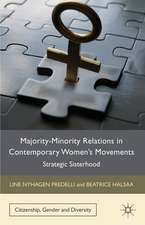The Struggle for Equality: Urban Women Workers in Prestate Israeli Society
Autor Deborah Bernsteinen Limba Engleză Hardback – 8 dec 1986
The object of this study is to clarify why and how it happened that women remained marginal in the processes of social change that took place during the development of Israeli society. Bernstein examines the role played by continuous unemployment, by the predominance of construction work, and by the dependence on the World Zionist Organization and the Mandate authorities. She also shows how the individual and collective achievements of women shaped the means for future achievements and how their failure impeded further efforts. The author demonstrates that their failure to change the status of women did not stem from any sort of biological imperative, nor from some inevitable trend of social movements towards conservatism, but rather from the power relations between the women who aspired to change and those who opposed it. The aspiration for change was real and ran deep, but its advocates were few and weak, while its adversaries--and the apathetic-- were numerous and strong. And, the struggle took place under economic conditions that would have made significant change difficult even if the balance of power had been more favorable. Finally, the author demonstrates how the movement for innovation and change lost its impetus, and conservative elements won.
Preț: 437.15 lei
Preț vechi: 707.40 lei
-38% Nou
83.65€ • 91.15$ • 70.49£
Carte tipărită la comandă
Livrare economică 23 aprilie-07 mai
Specificații
ISBN-10: 0275921395
Pagini: 219
Dimensiuni: 156 x 234 x 14 mm
Greutate: 0.49 kg
Editura: Praeger
Colecția Praeger















